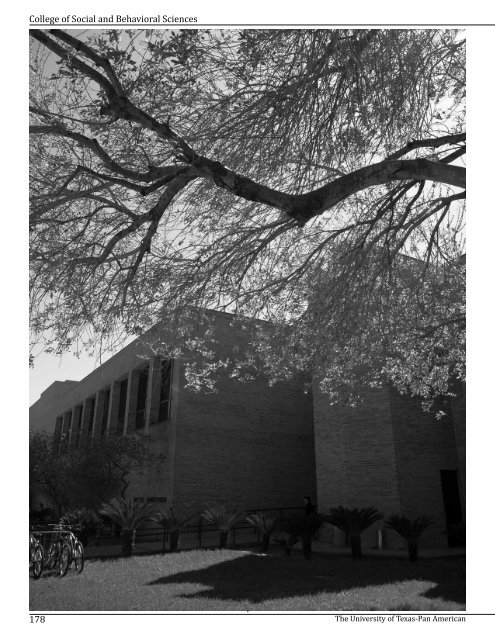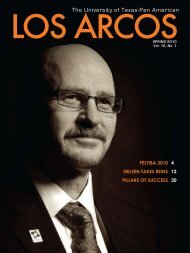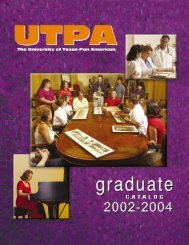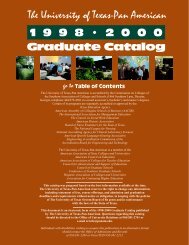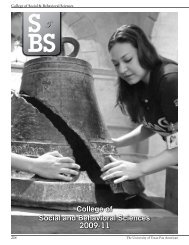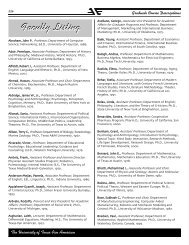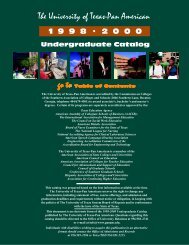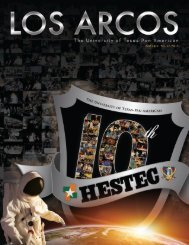College of social - The University of Texas-Pan American
College of social - The University of Texas-Pan American
College of social - The University of Texas-Pan American
You also want an ePaper? Increase the reach of your titles
YUMPU automatically turns print PDFs into web optimized ePapers that Google loves.
<strong>College</strong> <strong>of</strong> Social and Behavioral Sciences178<strong>The</strong> <strong>University</strong> <strong>of</strong> <strong>Texas</strong>-<strong>Pan</strong> <strong>American</strong>
COLLEGE OF SOCIALAND BEHAVIORALSCIENCESGeneral Overview<strong>The</strong> <strong>College</strong> <strong>of</strong> Social and Behavioral Sciences is composed<strong>of</strong> seven departments and programs: Criminal Justice,Global Security Studies, Military Science, Political Science,Psychology and Anthropology, Public Administration, andSociology.Academic Programs<strong>The</strong> <strong>College</strong> <strong>of</strong> Social and Behavioral Sciences <strong>of</strong>fers theMaster <strong>of</strong> Arts degree in psychology, Master <strong>of</strong> Science incriminal justice and sociology, and the Master <strong>of</strong> PublicAdministration, a pr<strong>of</strong>essional preparation program forpublic service in governmental agencies.Graduate majors in psychology may select a clinical oran experimental concentration. Within the experimentalpsychology concentration there is an option to pursuecertification as a Board Certified Behavior Analyst. Studentswho wish to pursue graduate study in anthropology mayopt for a Master <strong>of</strong> Arts degree in interdisciplinary studieswith a concentration in anthropology. Students with aninterest in global security may pursue a Master <strong>of</strong> Arts ininterdisciplinary studies with a concentration in GlobalSecurity Studies and Leadership. Students in the sociologygraduate program may choose a general sociology focus or aconcentration in regional studies or health and aging.In addition, the college provides support to graduateprograms in other colleges by providing several key graduatecourses.<strong>The</strong> college also <strong>of</strong>fers the Bachelor <strong>of</strong> Arts inanthropology, general studies, political science, psychology,and sociology, a Bachelor <strong>of</strong> Science in psychology, andBachelor <strong>of</strong> Science in criminal justice.Students may minor in anthropology, criminal justice,global security studies, military science, political science,public administration, psychology or sociology. Additionally,the Department <strong>of</strong> Military Science provides Army ROTCtraining that can lead to commissioning in the Army, ArmyReserve or National Guard.2011-2013 Graduate CatalogDr. Walter Diaz, DeanSocial and Behavioral Sciences Building, Room 2341201 W. <strong>University</strong> DriveEdinburg, TX 78539-2999Telephone: (956) 665-3551Fax: (956) 665-2180Web: http://www.utpa.edu/csbsDr. Grant Benham, Interim Assistant DeanDr. Gary Montgomery, Assistant DeanSocial and Behavioral Sciences Building, Room 2341201 W. <strong>University</strong> DriveEdinburg, TX 78539-2999Telephone: (956) 665-3551Fax: (956) 665-2180Criminal JusticeDr. S. George Vincentnathan,Department ChairSocial and Behavioral Sciences Building, Room 3211201 West <strong>University</strong> DriveEdinburg, TX 78539-2999Telephone: (956) 665-3566Fax: (956) 665-2490E-mail: gvincent@utpa.eduDr. Joseph Appiahene-Gyamfi, Graduate Program DirectorSocial and Behavioral Sciences Building, Room 319ATelephone: (956) 665-7061 or 665-3566Fax: (956) 665-3680E-mail: appiahen@utpa.eduGraduate FacultyAppiahene-Gyamfi, Joseph, Associate Pr<strong>of</strong>essorDearth, Daniel K., Associate Pr<strong>of</strong>essorEthridge, Philip, Associate Pr<strong>of</strong>essorResendez, Rosalva, Associate Pr<strong>of</strong>essorVincentnathan, S. George, Pr<strong>of</strong>essorVincentnathan, Lynn, Associate Pr<strong>of</strong>essorWhite, Thomas, Assistant Pr<strong>of</strong>essor___________________________________________________179
<strong>College</strong> <strong>of</strong> Social and Behavioral SciencesOverviewDegree Requirements<strong>The</strong> Master <strong>of</strong> Science in criminal justice is designed toaccomplish the following educational objectives:• Enhance the student’s competence in the content,principles, and methods <strong>of</strong> criminal justice.• Prepare students for administrative and managementpositions in federal, state and local criminal justiceagencies.• Prepare students for entry-level positions requiringgraduate degrees, such as federal probation, paroleand law enforcement agencies.• Prepare students for academic study beyond themaster’s degree.• Develop, through faculty and graduate research, acriminal justice knowledge base concerning issuesunique to the region, including Mexico and SouthAmerica.• Provide a resource for federal, state and local criminaljustice agencies in need <strong>of</strong> administrative assistance inpolicy analysis, development and program evaluation.Admission RequirementsApplicants must:1. Meet all requirements for graduate admission to UT <strong>Pan</strong><strong>American</strong> (see page 18), as well as the other requirementslisted below. Application for admission must besubmitted online. <strong>The</strong> application is available at www.utpa.edu/gradschool. Once submitted, applicants cancheck the status <strong>of</strong> their applications online or by contactingthe Graduate Office.2. Have demonstrated academic preparation for graduatework in criminal justice. This preparation wouldbe shown by (a) a bachelor’s degree in criminal justice,criminology, corrections, police administration, orclosely related field, or (b) a bachelor’s degree in anotherfield and graduate or advanced undergraduate courses inthe following areas: political science, psychology, publicadministration, <strong>social</strong> work or sociology, and (c) undergraduatecoursework in research methods and criminologicaltheory.3. (For students who would meet graduate studies admissioncriteria without a GPA <strong>of</strong> 3.0.) Have a grade pointaverage <strong>of</strong> 2.75 or higher on a 4.0 scale for the last 60semester hours or 90 quarter hours <strong>of</strong> undergraduatecourses completed, as shown on <strong>of</strong>ficial transcripts.Applicants should consult with the department’s graduateprogram director for additional program admissionsrequirements, including required admission materials.<strong>The</strong> Master <strong>of</strong> Science in criminal justice requires thesuccessful completion <strong>of</strong> a total <strong>of</strong> 36 graduate semesterhours. In addition, all students must pass a comprehensivewritten examination, testing knowledge from the corecourses.Students are expected to make satisfactory progress in theprogram. All students must maintain an overall 3.0 GPA in allgraduate courses and have no more than two grades <strong>of</strong> C inthe core.Core Courses(7 courses or 21 semester hours)Group ICRIJ 6301 <strong>The</strong>ories <strong>of</strong> Criminal JusticeCRIJ 6302 Advanced CriminologyCRIJ 6304 Criminal Law and ProcedureCRIJ 6306 Criminal Justice Research MethodsCRIJ 6307 Criminal Justice Research Methodsand StatisticsGroup IICRIJ 6303 Criminal Justice Policy-Development and AnalysisorCRIJ 6305 Criminal Justice Organizations-<strong>The</strong>ory and BehaviorGroup IIICRIJ 6309 Correctional <strong>The</strong>ories and IssuesorCRIJ 6310 Policing in a DemocracyElectivesCRIJ 6308 Youth Crime and JusticeCRIJ 6311 World Criminal Justice SystemsCRIJ 6313 Special Topics (may be repeatedonce if a new topic)CRIJ 6314 Women, Law and JusticeCRIJ 6315 VictimologyCRIJ 6316 Environmental Crime and JusticeCRIJ 6317 Organizational CrimeCRIJ 6318 Law in Culture and SocietyCRIJ 6322 TerrorismCRIJ 6325 Social Justice and Human RightsCRIJ 6332 Directed StudyCRIJ 6333 Independent Study<strong>The</strong>sis and Applied ResearchCRIJ 7102 One-Hour <strong>The</strong>sis CourseCRIJ 7301 <strong>The</strong>sis7302 <strong>The</strong>sis180<strong>The</strong> <strong>University</strong> <strong>of</strong> <strong>Texas</strong>-<strong>Pan</strong> <strong>American</strong>
Final RequirementStudents must pass a comprehensive written examinationin all the core courses.Course DescriptionsA listing <strong>of</strong> graduate courses <strong>of</strong>fered by the Department<strong>of</strong> Criminal Justice can be found in the Course Descriptionssection <strong>of</strong> this catalog beginning on Page 204.Master <strong>of</strong> Arts inInterdisciplinaryStudies, Global SecurityStudies and Leadership(GSSL)Lamar Campus Complex 1211201 W. <strong>University</strong> DriveEdinburg, TX 78539-2999Telephone: (956) 665-8088E-mail: castelanov@utpa.eduWeb: www.utpa.edu/gsslDegree Requirements2011-2013 Graduate CatalogCore Courses12 hoursGSSL 5300 Global SecurityGSSL 5305 Open Source ResearchGSSL 5320 Research and AnalysisGSSL 5330 Practicum in Global SecurityStudies and LeadershipSpecified Interdisciplinary Courses15 hoursCOMM 6322 Culture and CommunicationEPSY 6350 Introduction to StatisticsorEPSY 6351 Intermediate StatisticsMGMT 6334 International ManagementPSY 6340 Cross Cultural PsychologyGraduate-level elective course(*see adviser for a list <strong>of</strong> courses)Required Technical Competency Courses 9 hoursCSCI 6303 Principles <strong>of</strong> InformationTechnology SystemsCSCI 6318 Cyber Security and ForensicsMIS 6391 Information Security andAssurance ManagementGraduate FacultyChen, Xi, Assistant Pr<strong>of</strong>essorHansmann, Sandra, Associate Pr<strong>of</strong>essorTarawneh, Constantine, Associate Pr<strong>of</strong>essorGeneral Overview<strong>The</strong> Global Security Studies and Leadership (GSSL)graduate program prepares students for careers inintelligence, national security and other sectors <strong>of</strong> theglobal economy through advanced interdisciplinarystudies. This program will broaden the skill sets <strong>of</strong>students through focus on advanced research, effectivecross-discipline team communication and critical analysis.Given that jobs in government or private industry <strong>of</strong>tenrequire multidisciplinary cooperation, the GSSL programwill prepare students to work with people from differentbackgrounds, abilities, and knowledge bases. With thisapproach, students will have the opportunity to gain theperspective and pr<strong>of</strong>iciency <strong>of</strong> multiple disciplines.181
<strong>College</strong> <strong>of</strong> Social and Behavioral SciencesGraduate Certificate inGlobal Security Studiesand Leadership (GSSL)<strong>The</strong> importance <strong>of</strong> universities to train a new generation<strong>of</strong> young pr<strong>of</strong>essionals to take positions <strong>of</strong> leadership inthe global society has never been more critical. As thechallenges <strong>of</strong> the new century unfold, government agencies,private industry, consulting companies, and think tanks, willincreasingly rely on this new cadre <strong>of</strong> leaders to formulatepolicies and develop business strategies that are globallyaware while at the same time protecting the interest <strong>of</strong> theU.S. government and corporations. With this in mind, theCertificate in Global Security Studies prepares students in anumber <strong>of</strong> specific general competencies needed by a variety<strong>of</strong> employers in intelligence analysis and national securityfields while providing advanced graduate level educationdesigned to optimize learning in the skills <strong>of</strong> intelligenceanalysis.Certificate Sequence(12 hours)GSSL 5300 Global SecurityGSSL 5305 Open Source ResearchGSSL 5320 Research and AnalysisGSSL 5330 Practicum in Global Security Studies andLeadershipCourse DescriptionsA listing <strong>of</strong> graduate courses for the GSSL program can befound in the Course Descriptions section <strong>of</strong> this catalog onPage 233.Psychology andAnthropologyDr. Phillip Gasquoine,Department ChairSocial and Behavioral Sciences Building, Room 3561201 <strong>University</strong> DriveEdinburg, TX 78539-2999Telephone: (956) 665-2155Fax: (956) 665-3333E-mail: pgasquoine@utpa.eduWeb: http://www.utpa.edu/dept/psych-anth__________________________________________________PsychologyWeb: http://www.utpa.edu/psychologyDr. Philip Gasquoine, Pr<strong>of</strong>essorPsychology Graduate Program DirectorEducation Complex, Room 1.202ATelephone: (956) 665-2155E-mail: pgasquoine@utpa.eduWeb: http://www.utpa.edu/dept/gsprogGraduate FacultyAldridge, James W., Jr., Pr<strong>of</strong>essorAlfaro, Edna, Assistant Pr<strong>of</strong>essorBenham, Grant, Associate Pr<strong>of</strong>essorCain, Roy E., Associate Pr<strong>of</strong>essorCroyle, Kristin, Associate Pr<strong>of</strong>essorErnst, Fred, Pr<strong>of</strong>essorHarai, Michiyo, Assistant Pr<strong>of</strong>essorJames-Aldridge, Valerie, Associate Pr<strong>of</strong>essorJou, Jerwen, Pr<strong>of</strong>essorKendrick, Sherrill, Assistant Pr<strong>of</strong>essorMontgomery, Gary T., Pr<strong>of</strong>essorRogers, Darrin, Assistant Pr<strong>of</strong>essorWeimer, Amy, Assistant Pr<strong>of</strong>essorWinkel, Mark H., Associate Pr<strong>of</strong>essor_________________________________________________Overview182<strong>The</strong> Graduate Program in psychology <strong>of</strong>fers four optionsfor students:1. Clinical psychology, thesis option2. Clinical psychology, non-thesis option3. Experimental psychology, general4. Experimental psychology, Board CertifiedBehavior Analyst<strong>The</strong> <strong>University</strong> <strong>of</strong> <strong>Texas</strong>-<strong>Pan</strong> <strong>American</strong>
Students with a master’s degree in clinical psychology willbe eligible to apply for licensure as a psychological associateand pr<strong>of</strong>essional counselor in the state <strong>of</strong> <strong>Texas</strong>. Studentswith a master’s degree in experimental psychology, BoardCertified Behavior Analyst, will be eligible to complete thenational examination to become a Board Certified BehaviorAnalyst. Both experimental and clinical psychology graduatesare encouraged to transfer and continue their education in adoctoral psychology program.Admission RequirementsApplicants must:1. Meet all requirements for graduate admission toUT <strong>Pan</strong> <strong>American</strong> (see Page 18), as well as the otherrequirements listed below. Application for admissionmust be submitted online. <strong>The</strong> application is availableat www.utpa.edu/gradschool. Once submitted,applicants can check the status <strong>of</strong> their applicationsonline or by contacting the Graduate Office.2. Have completed at least 12 hours <strong>of</strong> undergraduatecourses in psychology including PSY 2401 BasicStatistics for Psychologists and PSY 3325 ResearchMethods in Psychology.3. Submit <strong>of</strong>ficial transcripts with a 3.0 GPA on a 4.0scale for the last 60 hours completed in psychologycoursework, and a 3.0 GPA on a 4.0 scale inundergraduate psychology coursework.4. Provide GRE scores in verbal and quantitative sections.5. Have submitted three letters <strong>of</strong> recommendation fromindividuals who are qualified to judge the student’sacademic and pr<strong>of</strong>essional potential.6. Submit a 500-word essay describing pr<strong>of</strong>essionalgoals and objectives and specifying the major option towhich they are applying.7. Submit a résumé <strong>of</strong> educational background, volunteerand work experience.Applicants will only be considered for acceptance to theprogram option (i.e. clinical, experimental) to which theyhave applied.Degree Requirements<strong>The</strong>sis Option in Clinical PsychologyA. Core Courses 27 hoursPSY 6301 Psychological StatisticsPSY 6305 Advanced Studies inPsychopathologyPSY 6311 Advanced Studies in Personality<strong>The</strong>oryPSY 6320 Neuropsychology PsychologyPSY 6325 Conditioning and LearningorPSY 6326 <strong>The</strong>oretical Issues in LearningPSY 6332 Research DesignPSY 6336 Advanced PsychologicalMeasurement2011-2013 Graduate CatalogPSY 6340 Cross Cultural PsychologyPSY 6363 Contemporary Pr<strong>of</strong>essional Issuesand Ethics in PsychologyB. Clinical Applications 6 hoursPSY 6352 Personality AssessmentPSY 6354 Individual PsychotherapyC. Supervised Clinical Practice Courses 15 hoursPSY 6364 Clinical Practicum I (repeat twice)PSY 6368 Internship (480 hours)PSY 7370 <strong>The</strong>sis (repeated twice)TOTALNon-<strong>The</strong>sis Option in Clinical Psychology48 hoursA. Core Courses 24 hoursPSY 6301 Psychological StatisticsPSY 6305 Advanced PsychopathologyPSY 6311 Advanced Studies inPersonality <strong>The</strong>oryPSY 6320 NeuropsychologyPSY 6325 Conditioning and LearningorPSY 6326 <strong>The</strong>oretical Issues in LearningPSY 6336 Advanced PsychologicalMeasurementPSY 6340 Cross Cultural PsychologyPSY 6363 Contemporary Pr<strong>of</strong>essional Issuesand Ethics in PsychologyB. Clinical Applications 9 hoursPSY 6352 Personality AssessmentPSY 6354 Individual PsychotherapyPSY 6356 Group PsychotherapyC. Designated Electives for licensedpr<strong>of</strong>essional counselors6 hoursPSY 6330 Developmental PsychologyEPSY 6366 Lifestyle and Career DevelopmentD. Supervised Clinical Practice Courses 9 hoursPSY 6364 Clinical Practicum I (repeat twice)PSY 6368 Internship (480 hours)Total Hours Required for the OptionOption in Experimental Psychology48 hoursA. Core Courses 18 hoursPSY 6311 Advanced Studies in Personality<strong>The</strong>oryPSY 6320 NeuropsychologyPSY 6325 Conditioning and LearningorPSY 6326 <strong>The</strong>oretical Issues in LearningPSY 6332 Research DesignPSY 6336 Advanced PsychologicalMeasurement183
<strong>College</strong> <strong>of</strong> Social and Behavioral SciencesPSY 6301 Psychological StatisticsB. Electives 12 hoursTo be selected in conjunction with the graduate adviser.C. <strong>The</strong>sis Requirement 6 hoursPSY 7370 <strong>The</strong>sis (repeated twice)Total Hours Required for the OptionOption in Experimental Psychology:Board Certified Behavior Analyst36 hoursA. Core Courses 46 hoursPSY 6174 Special Topics in Psychology(repeated four times)PSY 6301 Psychological StatisticsPSY 6315 Applied Behavior AnalysisPSY 6320 NeuropsychologyPSY 6330 Developmental PsychologyPSY 6332 Research DesignPSY 6334 Single Subject Designs and ProgramEvaluationPSY 6340 Cross-Cultural PsychologyPSY 6350 Behavioral AssessmentPSY 6363 Contemporary Pr<strong>of</strong>essional Issuesand Ethics in PsychologyPSY 6365 Applied Behavior AnalysisPracticum (repeated four times)PSY 6376 Directed StudiesB. Electives 0 hoursNo elective hours are requiredC. <strong>The</strong>sis Requirement 6 hoursPSY 7370 <strong>The</strong>sis (repeat two times)Total Hours Required for the Option52 hoursAll students must complete a comprehensive examinationas part <strong>of</strong> the graduation requirements.Course DescriptionsA listing <strong>of</strong> psychology graduate courses <strong>of</strong>fered by theDepartment <strong>of</strong> Psychology and Anthropology can be found inthe Course Descriptions section <strong>of</strong> this catalog on Pages 269.OverviewAnthropologyWeb Site: http://www.utpa.edu/anthropologyGraduate FacultyDiaz-Barriga, Miguel, Pr<strong>of</strong>essorDorsey, Margaret, Assistant Pr<strong>of</strong>essorGraham, Margaret, Associate Pr<strong>of</strong>essorHinojosa, Servando, Associate Pr<strong>of</strong>essorPozorski, Shelia, Pr<strong>of</strong>essorPozorski, Thomas, Pr<strong>of</strong>essorShowronek, Russell, Pr<strong>of</strong>essorVincentnathan, Lynn, Associate Pr<strong>of</strong>essor__________________________________________________UT <strong>Pan</strong> <strong>American</strong> <strong>of</strong>fers interdisciplinary degreeprograms at the graduate level including a Master <strong>of</strong> Artsin interdisciplinary studies. Graduate courses available inanthropology enable graduate students to:1. Complete a Master <strong>of</strong> Arts degree in interdisciplinarystudies with a concentration in anthropology.2. Take graduate anthropology courses as electiveswithin other graduate programs.Students pursuing either option are expected to meet withthe anthropology coordinator or other anthropology facultyin order to develop a program <strong>of</strong> study.This degree is structured as follows:<strong>The</strong>sis OptionEighteen hours in anthropology, including the thesis(concentration area).Required CoursesANTH 6345 Anthropological Method and<strong>The</strong>oryANTH 7300 <strong>The</strong>sisANTH 7301 <strong>The</strong>sisNine hours in Discipline Two.Nine hours in Discipline Three.184<strong>The</strong> <strong>University</strong> <strong>of</strong> <strong>Texas</strong>-<strong>Pan</strong> <strong>American</strong>
Non-<strong>The</strong>sis OptionEighteen hours in anthropology (concentration area).Required CourseANTH 6345 Anthropological Method and<strong>The</strong>oryNine hours in Discipline Two.Nine hours in Discipline Three.Graduate courses available in anthropology also enablegraduate students to take anthropology courses as electiveswithin other graduate programs, such as English or history.Course DescriptionsA listing <strong>of</strong> anthropology graduate courses <strong>of</strong>fered by theDepartment <strong>of</strong> Psychology and Anthropology can be found inthe Course Descriptions section <strong>of</strong> this catalog on Page 189.PublicAdministrationDr. William L. Turk,DirectorSocial and Behavioral Sciences Building, Room 2291201 West <strong>University</strong> DriveEdinburg, TX 78539-2999Telephone: (956) 665-2545Fax: (956) 665-2139Graduate FacultyBorrego, Espiridian Al, Associate Pr<strong>of</strong>essorLynch, Cynthia, Associate Pr<strong>of</strong>essorMilford, John, LecturerMontesdeoca, Richard, LecturerTurk, William, Associate Pr<strong>of</strong>essorZemrani, Aziza, Assistant Pr<strong>of</strong>essor__________________________________________________2011-2013 Graduate CatalogGraduate Program<strong>The</strong> Department <strong>of</strong> Public Administration <strong>of</strong>fers graduatestudy toward a Master <strong>of</strong> Public Administration (MPA)degree. <strong>The</strong> MPA is a pr<strong>of</strong>essional preparation programfor public service in governmental agencies at the federal,state, regional and local levels. <strong>The</strong> student must meet allrequirements for graduate admission to UT <strong>Pan</strong> <strong>American</strong>(see Page 18). Application for admission must be submittedonline. <strong>The</strong> application is available at www.utpa.edu/gradschool. Once submitted, applicants can check the status<strong>of</strong> their applications online or by contacting the GraduateOffice.Degree Requirements<strong>The</strong> MPA degree requires successful completion <strong>of</strong> either39 or 42 total graduate hours.• Track I: 18 hours in core courses, 15 hours indesignated electives, plus internship, 6 hours in eitherthesis or applied research grant project. A total <strong>of</strong> 39semester credit hours.• Track II: 18 hours in core courses, 21 hours indesignated electives, plus internship, 3 hours in thecapstone course, PUBA 6306 Public Administration:Past, Present, and Future. A total <strong>of</strong> 42 semester credithours. <strong>The</strong>sis and/or applied research grant projecthours will not be counted within the 42 hour total forTrack II.Program ContinuationWhen a grade <strong>of</strong> C or lower is received in three or morecourses in the program (even if the course is repeated and ahigher grade is received), a master’s candidate is ineligibleto continue in the program or to take the comprehensiveexamination. A student must maintain a 3.0 GPA or higher.Prerequisite<strong>The</strong> students who have no public sector work experienceor have taken no advanced PUBA or POLS courses must takePUBA 6301 <strong>The</strong> Public Administration Pr<strong>of</strong>ession. Studentswhose academic preparation in public administration orpolitical science is deficient may be required to do additionalleveling coursework before gaining clear admission to theprogram.185
<strong>College</strong> <strong>of</strong> Social and Behavioral SciencesCore CoursesStudents will be required to take 18 hours <strong>of</strong> core courses.<strong>The</strong>se include three hours covered by PUBA 6302 GraduateSeminar in Public Administration, and five other core coursesin the five program areas recommended by the NationalAssociation <strong>of</strong> Schools <strong>of</strong> Public Affairs and Administration(NASPAA). <strong>The</strong> five program areas and the five core coursesare:NASPAAArea A-Political Social EconomicPUBA 6305 EnvironmentProblems in State and LocalGovernmentNASPAAArea B-Public Policy AnalysisPUBA 6312 Policy Implementation andProgram EvaluationNASPAAArea C-Managerial ProcessesPUBA 6321 Public Personnel AdministrationNASPAAArea D-Analytical ToolsPUBA 6330 Scope and Methods in PublicAdministrationNASPAAArea E-Individual-GroupPUBA 6341 Organizational BehaviorPolitical Leadership: DecisionMaking and Managementin Public OrganizationsDesignated ElectivesStudents will take 12 hours <strong>of</strong> courses supportive <strong>of</strong> studywithin the discipline. Courses may be taken from the fiveNASPAA program areas, six hours may be taken outside thedepartment in approved graduate level courses.186PUBA 6303 Ethics for Public ServicePUBA 6304 Intergovernmental RelationsPUBA 6307 <strong>The</strong> Politics <strong>of</strong> ScarcityPUBA 6309 Introduction to PlanningPUBA 6311 Formulation <strong>of</strong> Public PolicyPUBA 6320 Public Finance AdministrationPUBA 6322 Intro to Community DevelopmentPUBA 6323 Management <strong>of</strong> GovernmentalInformation SystemsPUBA 6327 Management <strong>of</strong> Nonpr<strong>of</strong>itOrganizationsTrack II Required ElectiveStudents selecting the Track II exit strategy are requiredto take PUBA 6306 in partial fulfillment <strong>of</strong> the 42-hourrequirement. PUBA 6306 may not be taken until the studenthas accumulated 33 or more hours.InternshipStudents who do not have work experience in publicadministration will be required to complete a three-hourinternship. This course is PUBA 6325. (Students employedfull time in the public sector may use their present positionto replace the internship experience upon approval). Allstudents are strongly encouraged to take the internshipcourse.Course DescriptionsA listing <strong>of</strong> graduate courses <strong>of</strong>fered by the Master <strong>of</strong>Public Administration Program can be found in the CourseDescriptions section <strong>of</strong> this catalog beginning on Page 271.SociologyDr. Miguel Diaz-Barriga,Department ChairSocial and Behavioral Sciences Building, Room 3441201 <strong>University</strong> DriveEdinburg, TX 78539-2999Telephone: (956) 665-3321Fax: (956) 665-2343E-mail: diazbarrigam@utpa.eduDr. Igor RyabovGraduate Program AdviserSocial and Behavioral Sciences Building, Room 344ATelephone: (956) 665-8798E-mail: ryabovi@utpa.eduGraduate FacultyGuerra, Ramon S., Associate Pr<strong>of</strong>essorRaajpoot, Uzzer A., Associate Pr<strong>of</strong>essorRyabov, Igor, Assistant Pr<strong>of</strong>essorSu, Dejun, Assistant Pr<strong>of</strong>essorWang, Guang-zhen, Pr<strong>of</strong>essor_________________________________________________Mission Statement<strong>The</strong> mission <strong>of</strong> the graduate program <strong>of</strong> the Department<strong>of</strong> Sociology at <strong>The</strong> <strong>University</strong> <strong>of</strong> <strong>Texas</strong>-<strong>Pan</strong> <strong>American</strong>is to prepare students who complete our program withthe knowledge and the technical expertise to be effectivespecialists, analysts and administrators in a variety <strong>of</strong><strong>social</strong> settings, such as federal, state and local governmentagencies, school districts, community health and agingorganizations, marketing firms and evaluation programs.<strong>The</strong> <strong>University</strong> <strong>of</strong> <strong>Texas</strong>-<strong>Pan</strong> <strong>American</strong>
<strong>The</strong> department <strong>of</strong>fers a curriculum with strong emphasis onmethods, statistics and theory that prepare students seekingto continue their studies to succeed in doctoral programs insociology.In order to accomplish our mission, the departmentpursues excellence in teaching, research and pr<strong>of</strong>essionalservice, and provides students with research and classroomteaching experience. Our mission is consistent with themission <strong>of</strong> the <strong>University</strong>.General OverviewCandidates for the master’s degree may choose a generalsociology focus, a concentration on inequality and poverty(including Mexican <strong>American</strong> society and border and inter-<strong>American</strong> issues), a concentration on health and aging(including such topics as health care research and analysis,health care systems, research methods), or a concentrationon technical research and program evaluation.Admissions Requirements1. Meet all requirements for graduate admission toUT <strong>Pan</strong> <strong>American</strong> (see Page 18), as well as the otherrequirements listed below. Application for admissionmust be submitted online. <strong>The</strong> application isavailable at www.utpa.edu/gradschool. Oncesubmitted, applicants can check the status <strong>of</strong> theirapplications online or by contacting the GraduateOffice.2. Have had at least 15 undergraduate hours in sociologyor demonstrated competence from equivalentcoursework in similar liberal arts discipline.3. Submit a letter <strong>of</strong> intent and a completedapplication.4. Have submitted two letters <strong>of</strong> recommendation fromindividuals who are qualified to judge the student’sacademic and pr<strong>of</strong>essional development.Note: Students not meeting these requirements may beadmitted on a conditional basis and will need to meetany conditions indicated by the graduate adviser.Designated Electives2011-2013 Graduate CatalogSelect 24 hours <strong>of</strong> electives, six <strong>of</strong> which may be thesishours.Other ElectivesStudents may select three to six hours <strong>of</strong> approvedgraduate electives from other disciplines.Sequencing <strong>of</strong> Core CoursesIt is estimated the master’s program in sociology can becompleted in four semesters for students who are enrolledfull time in the program (nine semester credit hours persemester) and four semesters and two summer terms forpart-time students. Based on the four-semester model tocomplete the graduate degree, we suggest that studentsorganize the coursework along the following timeline: <strong>The</strong>first semester <strong>of</strong> graduate work is left open for students tomake up deficiencies or take electives. During the secondsemester, students can take Sociology 6300 and 6301. Duringthe third and fourth semesters, students can take Sociology6302, 6303 and 6304. Part-time students are stronglyencouraged to complete their degrees along this timeline byenrolling in two summer school terms (first and second year<strong>of</strong> graduate work) for a total <strong>of</strong> six hours each term.In addition to a general sociology program, the department<strong>of</strong>fers three possible areas <strong>of</strong> concentration:Social InequalityHealth and AgingApplied Research and Program EvaluationCourse DescriptionsA listing <strong>of</strong> graduate courses <strong>of</strong>fered by the Department <strong>of</strong>Sociology can be found in the Course Descriptions section <strong>of</strong>this catalog on Page 279.Degree RequirementsTo receive the Master <strong>of</strong> Science in sociology, a candidatemust complete a total <strong>of</strong> 36 hours <strong>of</strong> graduate study,including 12 hours <strong>of</strong> core requirements. <strong>The</strong> writing <strong>of</strong> athesis is optional for receiving the degree. Students choosingthe thesis option are required to complete 36 hours <strong>of</strong>graduate study, including 15 hours <strong>of</strong> core requirements andsix hours <strong>of</strong> thesis.Core CoursesSOCI 6300 Graduate StatisticsSOCI 6301 Graduate Social <strong>The</strong>orySOCI 6302 Graduate Research MethodsSOCI 6304 Graduate Research Analysis187


